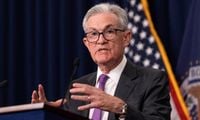The Australian share market is edging into positive territory after US President Donald Trump foreshadowed a major trade deal announcement with the UK, set to take place on May 9, 2025. This news has buoyed investor sentiment, reflected in the rise of US futures. Meanwhile, the US Federal Reserve has held interest rates steady, a decision that could have significant implications for both the US and Australian economies.
The All Ordinaries Index (ASX: XAO) is up 0.1%, with the ASX 200 also showing a modest increase of 0.1% to 8,185 points. The Australian dollar has dipped by 0.5% to 64.53 US cents, while major US indices closed higher, with the Dow Jones up 0.7%, the S&P 500 gaining 0.4%, and the Nasdaq rising 0.3%. In Europe, however, markets have seen declines, with the FTSE down 0.4%, the DAX decreasing by 0.6%, and the EuroStoxx 600 falling by 0.5%.
In commodities, spot gold has increased by 1.2% to $3,405 per ounce, Brent crude has risen by 0.4% to $61.39 per barrel, and iron ore has gained 0.8% to $98.25 per tonne. Bitcoin has also seen a surge, up 2.1% to $98,769.
Commonwealth Bank's chief economist Luke Yeaman has expressed optimism regarding Australia's economic outlook, suggesting that Labor is likely to oversee an improving economy after weathering the inflation storm it inherited in 2022. Yeaman noted, "In many ways, the economic picture leading into this Parliament is more positive than the one Labor inherited in their first term, which was dominated by cost of living pressures, weak household sentiment, and the need to keep pressure off inflation." He anticipates that economic growth will continue through 2025, with headline and underlying inflation returning to the Reserve Bank of Australia's (RBA) target band for the first time since 2014. This situation paves the way for a potential 25 basis point interest rate cut in May.
However, Yeaman cautions that the government will face significant challenges, including navigating the global trade war, tackling housing affordability, and managing the net zero transition. He believes these forces may compel Labor to reconsider policies not taken to the 2025 election, particularly if the housing debate intensifies.
In a concerning development for Woodside Energy, nearly 20% of shareholders opposed the re-election of the chair of the Sustainability Committee during the company’s annual general meeting (AGM) in Perth. The vote against Ann Pickard signals growing dissatisfaction among investors regarding the company’s climate risk management. The Australasian Centre for Corporate Responsibility commented that this is the worst vote on record against a Committee Chair for Woodside, highlighting the increasing pressure on the company from both investors and climate activists. During the AGM, climate protestors disrupted proceedings, heckling Chief Executive Meg O’Neill and causing several suspensions.
Meanwhile, Thomas Mathews, Head of Markets at Capital Economics, has remarked that investors may be overly optimistic about the number of interest rate cuts anticipated from the Federal Reserve this year. Following the Fed's decision to hold rates steady, Mathews emphasized the cautious tone adopted by the central bank, suggesting that it is more likely to maintain its current stance until next year.
On the employment front, Commonwealth Bank economists have predicted an uptick in quarterly wage growth for the first quarter of 2025. They attribute this to higher wage agreements stemming from recent enterprise agreements and awards. Stephen Wu, an economist at Commonwealth Bank, noted, "We view such an outcome as a wage ‘catch-up’ and not indicative of a re-tightening in the labour market." Despite a softening labour market, real wages are expected to continue growing as inflation has returned to the RBA’s target band.
In the wake of the Fed's decision to maintain its benchmark interest rate, many analysts are looking ahead to the RBA's upcoming meeting. The RBA had previously trimmed the cash rate to 4.10% in February and is expected to announce its next decision on May 20, 2025. Saul Eslake, a noted economist, has indicated that the RBA will set its cash rate based on Australian economic conditions rather than following the Fed's lead. He anticipates that a rate cut will be due to Australian inflation being back in the RBA's target band.
Market expectations are high for another rate reduction at the RBA's May meeting, which could further stimulate the property market by increasing borrowing capacities. However, if the RBA cuts rates below US rates, it could weaken the Australian dollar, making Australian real estate more appealing to foreign investors.
Overall, the Australian share market is navigating a complex landscape shaped by both domestic economic factors and global developments. As investors await the details of Trump's anticipated trade deal with the UK, they are also keeping a close eye on the RBA's monetary policy decisions and their potential impact on the economy.




